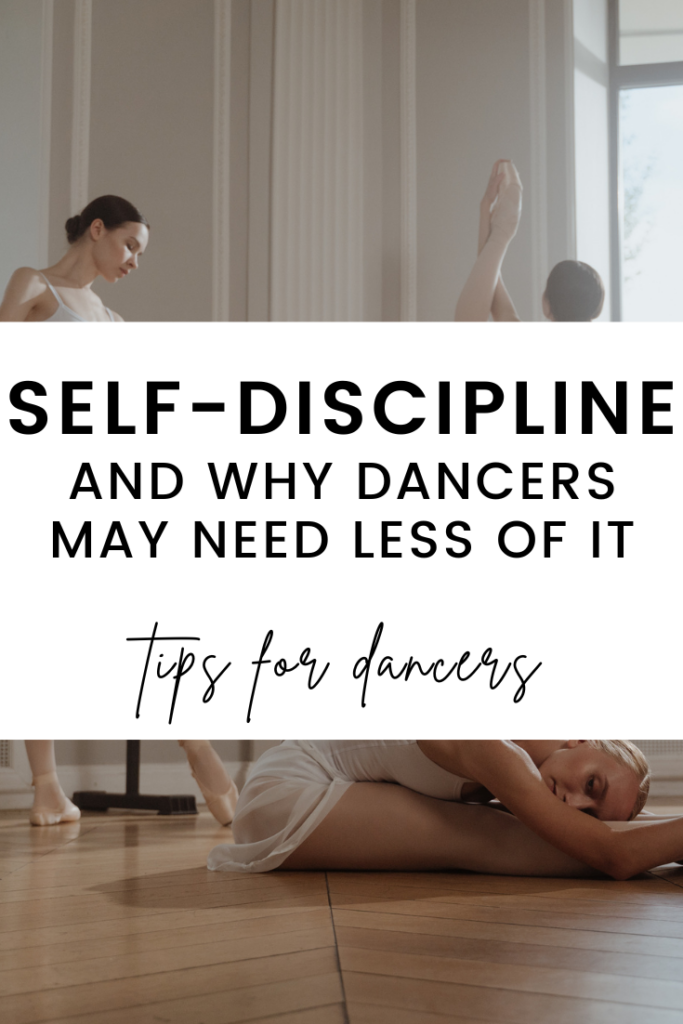As a former dancer turned Registered Dietitian Nutritionist, I can attest to a few common traits that, for most dancers at some point in their training and careers, feel relatable. Self-discipline is one and preliminary research even suggests that a relationship exists between one’s degree of self-discipline and some forms of physical activity.
For much of my teenage years and throughout my twenties, I could definitely relate. I never needed an external push to get to class, to cross-train, or to “eat well.” And while these efforts were often praised, they didn’t actually support me long-term. I didn’t know it at the time, but my sense of self-discipline was rooted in a battle of perfectionism and warped in what I thought was “right.”
Dancers and self-discipline: the untold reality
Fast forward. As a 30-something-year-old and a Mom of two, things (thankfully) are different. Like many of the dancers whom I now support, I was stuck and struggling to identify the difference between self-discipline and self-care. What felt like a road to success only led me to burnout and injury.
Today, I’m still the same girl I was during the struggle. And thanks to ballet, I even have the same self-discipline. The only difference is that now, my perceived self-discipline is defined by me and not by dancer diet culture. My self-discipline is motivated by self-compassion NOT by self-control.
Self-discipline doesn’t have to be a limiting factor in the sustainability of a dancer’s training. But for it to actually be supportive, it needs to be redirected.
Self-Control and Food: Willpower Backfires
In the context of food, willpower often refers to one’s apparent degree of self-control (AKA self-discipline) around certain foods or food groups. But contrary to what we’re often told, willpower will not support your efforts to resist food or any one type of food (most often those deemed “off limits.”)
There are biological and psychological mechanisms that cause our bodies to override restrictions until basic needs like calorie replenishment are met. This is why, for anyone who feels super “disciplined” over food, a binge- and restrict- cycle ensues. And side note: for a sub-set of dancers, the ability to stick with these food restrictions for any length of time often builds the groundwork for an eating disorder.
But I feel best when in control
Feeling in control, especially when so much in life can feel out of our immediate control is comforting. But these feelings of comfort are fleeting, especially because restrained eating eventually fails. Ask yourself: are these behaviors truly supporting my emotional and mental well-being? A few red flags that represent unsupportive behaviors, include:
- Obsessing over numbers like body weight and calorie counts
- Overwhelming stress around ingredients and “processed” foods
- Keeping up with exhaustive exercise or dance schedules
Now reevaluate what it means to feel your best. A few prompts to consider, include:
- What are you gaining from those obsessive behaviors? Is it comfort? Is it relaxation?
- What might you lose when you’re obsessing over calories, weight, and/or movement regimens? Is it socialization? The ability to focus in class?
- Can you list a few ways to meet your need for comfort using more productive activities?
- Our time is limited and life is short. How do you really want to spend your time?
When we shift our food- and dance- focus from body size manipulation to joy, we uncover more mental real estate to prioritize other things in life. This is a major area for growth! Rather than attempting to revoke your self-discipline, try to redirect it in more productive ways. Here is some help:
10 ways to redirect self-discipline to support self-care
- Get to bed 30 minutes earlier than usual. Good sleep patterns can help with your dancing.
- Stop scrolling before bed. This one’s self-explanatory.
- Take a social media break when a comparative mindset creeps in. Comparisons are inevitable… try to reduce the temptation!
- Make time for a friend, even if it’s just a coffee date.
- Meal prep in a way that feels practical. Here’s an article that offers really easy advice.
- Prioritize snacks. Start with just 10 minutes and prioritize a day’s worth of balanced snacks. Here are examples.
- Schedule a daily 15-minute “choice time.” I totally stole this from my son’s teacher, but hear me out. 15 minutes of unstructured and unplanned activity helps to keep you flexible. Whether it’s a book, beading, coloring, or listening to a podcast, anything goes.
- Get dressed and put on a favorite outfit. Even without a destination, wearing clothing that is both comfortable and supportive of your here-and-now body helps.
- Meal plan, but flexibly. The dancers I work with know how important our flexible meals become during hectic days.
- Practice self-compassion. Take a moment to journal, meditate, or simply reflect. Your acknowledgment of this shift is reason enough to celebrate!




